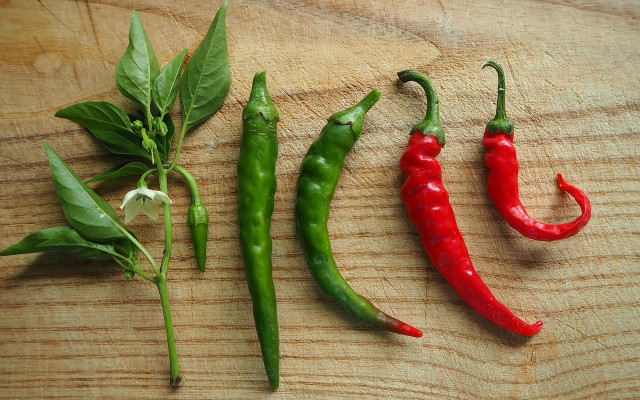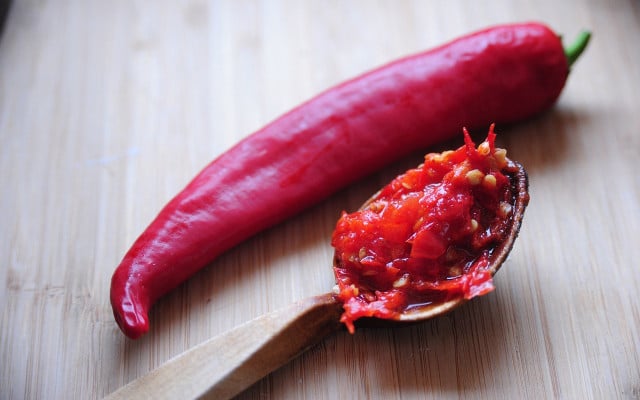Some cite the endless health benefits of spicy food. Others warn too much spice can be bad for you. So, is spicy food good for you or not?
From Jamaican jerk to mouthwatering tacos, Americans love spicy food. No matter what state you live in, odds are you can easily find a wide range of spicy dishes from all over the globe. Since spicy food holds such a special place in our hearts and on our plates, let’s get to know it a little better. A common question is: Is spicy food good for you?
Some say it can boost your immune system, clear your sinuses or even help you lose weight naturally. Below, we’ll outline the health benefits of spicy food and explore how and why spicy food is good for you (and when it’s bad).
If you’ve overspiced your food and need help cooling it down, check out 10 Foolproof Fixes to Make Food Less Spicy.
How We Measure Spiciness
When we perceive a particular dish or food as spicy, our reaction has less to do with taste than it does with a purely physical response. The sensation we get when eating spicy food is a reaction of the temperature and pain receptors in our mouths. And different substances elicit different responses. Capsaicin contained in chilies makes them particularly pungent, piperine acts as an arousing agent in pepper, while the active ingredient responsible for spice in ginger is known as gingerol.
The level of spiciness of chilies and chili products can be measured on the Scoville scale with the unit Scoville (SHU). The precise degree of spice is determined by capsaicin content: For instance, 1 milligram of capsaicin per kilogram (or 1 part per million) corresponds to 16.1 SHU.

Here are a few of examples of common spicy foods to give you an idea of the Scoville scale:
- Hot pepper: 100 – 500 SHU
- Tabasco: 2,500 – 8,500 SHU
- Habaneros: 100,000 – 250,000 SHU
- Pure capsaicin: 16,000,000 SHU
Is Spicy Food Good For You? The Health Benefits
So what’s the catch – is spicy good for you or not? The chemical capsaicin responsible for spiciness in peppers is proven to possess a number of health benefits. Spicy food lovers can look forward to the following health-promoting properties:
- Weight loss: Although deep-fried chicken wings drenched in spicy sauce probably won’t cut it, hot peppers may help you burn calories by kick-starting your metabolism.
- Lower risk of obesity and high blood pressure: Scientists from Qatar University’s human nutrition department found chili consumption is linked to a lower risk of obesity. It02 was also found to help adults with hypertension (high blood pressure).
- Eating spicy food may help you live longer: Researchers in China found that “those who consumed spicy foods 6 or 7 days a week showed a 14 percent relative risk reduction in total mortality,” according to a comprehensive population-based study. Lu Qi, professor of nutrition at Harvard’s school of public health, cites the potential for a reduction in “deaths due to cancer, heart disease, and respiratory diseases.” Capsaicin may be responsible for this as it has been found to improve metabolism, cholesterol in the blood as well as inflammation.
Spicy Food and Life Expectancy
All in all, there are many good reasons why you should eat spicy food. In terms of life expectancy, there are a number of studies out there that suggest that spicy food reduces the risk of death (e.g. this population-based study by the Association of Hot Red Chili Pepper Consumption and Mortality). However, the majority of these studies lack sufficient scientific evidence.
One common issue with tracing the health benefits of spicy food is separating correlation from causation — in other words, it’s difficult to separate cause from effect. Harvard School of Public Health puts it like this: “if people use spices on their food to replace salt, it could be the reduced salt intake that provides a health benefit — not necessarily the addition of spices.”
Another factor to consider is that we tend to eat a lot of chilis along with vegetables. That may also contribute to the health benefits of spicy food — never underestimate the value of a balanced diet.
When is Spicy Food Bad For You?



Some like it hot. Others like it ghost pepper hot (1,041,427 SHU) and often have a couple of jugs of milk at the ready in case things go south. So when exactly does spicy food stop being good for you? Well, it depends on how spicy. It also depends on whether we’re considering immediate or long-term effects.
Let’s look back to capsaicin. This active component in spicy chili peppers activates the neurons responsible for pain reception. Here, your body receives a signal of the presence of heat in the same manner as with an actual burn. So if the amount of capsaicin is more than you should consume at one time (depending on individual tolerance), you bet your body — in most cases, your stomach — will act fast to neutralize the threat.
Immediate physical symptoms of ingesting too much capsaicin contained in extremely spicy foods may include:
- Nausea and vomiting
- Abdominal pain and diarrhea
- Uncomfortable, irritable bowels
- Burning sensation when ingested
- High blood pressure
Overall, there don’t seem to be any serious long-term dangers to eating incredibly spicy peppers or other spicy foods.
In an article written on the topic of the health benefits of spicy food, University of Chicago Medicine gastroenterologist Edwin McDonald says that although patients cite spicy food as the suspected culprits for a number of gastrointestinal problems, such as ulcers, this is likely not the case. “Contrary to popular belief, multiple studies show that capsaicin actually inhibits acid production in the stomach. As a matter of fact, capsaicin has been considered as a medication for preventing ulcer development in people who take non-steroidal anti-inflammatory drugs.”
Eating Hot Food: Just the Right Amount
Those who choose to enjoy a tolerable amount of heat in their food generally have nothing to fear. Combined with a balanced diet, spicy food can be good for you. It has a lot to offer in the way of health benefits. For those keen on tempting their tummies with insane amounts of heat, spiciness can have unpleasant — but not life-threatening — consequences. To avoid these, follow these tips:
- Wear gloves when cutting or otherwise processing chilies. If you don’t have gloves at the ready, be sure to wash your hands thoroughly afterward and avoid touching your eyes.
- Keep your first bites small, and try not to use too much seasoning before knowing how hot it is.
- Capsaicin is fat-soluble. If you’ve overdone it, you can remedy the burning sensation with dairy products (milk) or starchy foods (bread).
Healthy and Delicious Spicy Food Recipes
The answer to “is spicy food good for you” is clearly a resounding “yes!” So, if you want to widen your repertoire of spicy recipes, check out some of our favorite (relatively) good-for-you treats:
- Spicy & Flavorful Vegan Cauliflower Wings
- Green Hot Sauce 2 Ways
- Bavarian Sweet Mustard: Base Recipe & Spicy Variations
- Spice Up Your Life With This Homemade Chinese Hot Sauce
Want to learn more about sustainability and the environment? Follow us on Instagram or Twitter!
Important Information regarding Health-related Topics.
** Links to retailers marked with ** or underlined orange are partially partner links: If you buy here, you actively support Utopia.org, because we will receive a small part of the sales proceeds. More info.Do you like this post?






